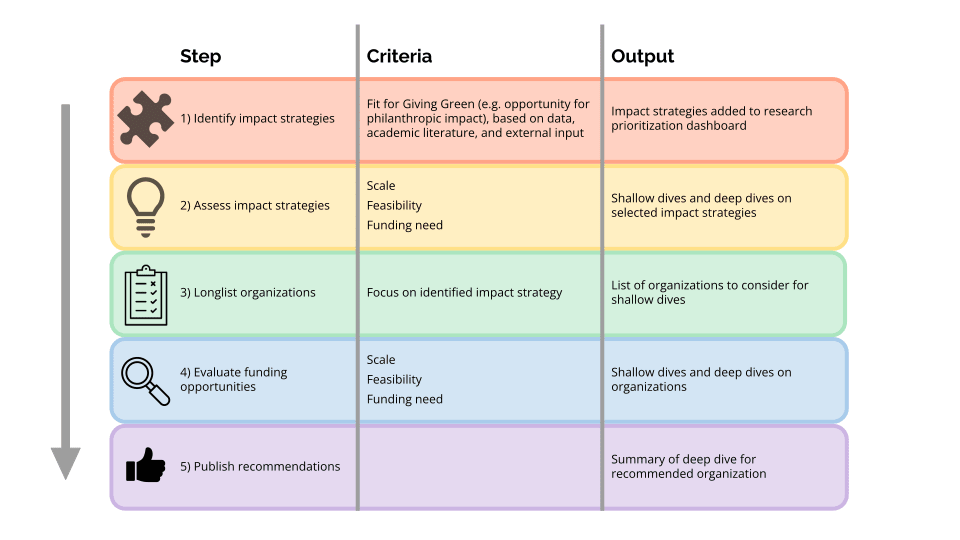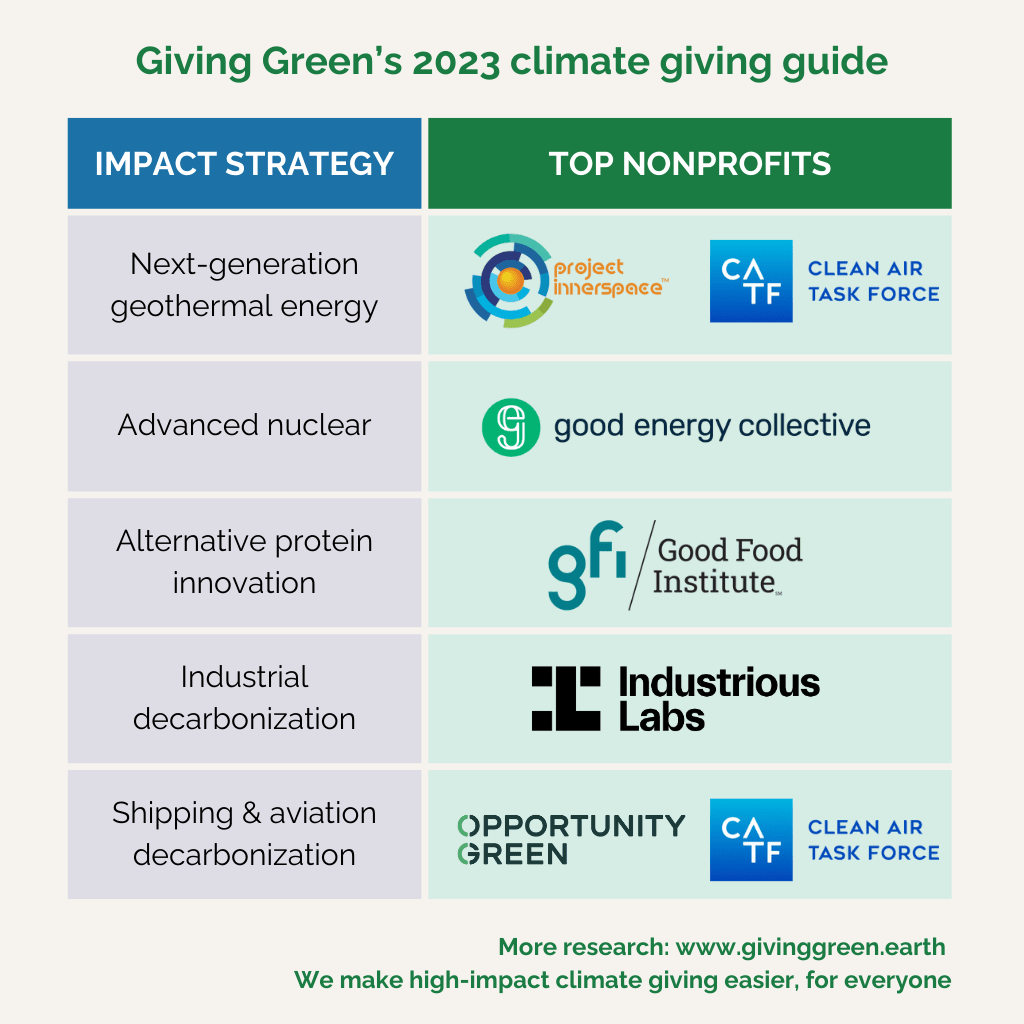What is Giving Green?
Giving Green is an EA-affiliated charity evaluator that helps donors direct funds to the highest-impact organizations looking to mitigate climate change. We believe that individuals can make a real impact by reshaping the laws, norms, and systems that perpetuate unsustainable emissions. Our annual list of recommendations helps direct donors towards high-impact climate nonprofits advocating for systemic change.
How does Giving Green work?
We spent the past year finding timely giving strategies that have a huge potential impact but are relatively neglected by traditional climate funding.
Our process starts by assessing various impact strategies and narrowing in on ones that we believed could substantially reduce emissions, were feasible, and needed more funding (Figure 1). After developing a short list of impact areas, we explored the ecosystem of nonprofits operating in each space by speaking directly with organizations and other stakeholders. We used our findings to evaluate each organization’s theory of change and its capacity to absorb additional funding.
For more information, see Giving Green’s Research Process.
Figure 1: Giving Green’s process for identifying and assessing nonprofits
What climate nonprofits does Giving Green recommend for 2023?
Our findings led us to double down on one pathway where we believe climate donors can have an outsized impact:
Advancing key climate technologies through policy advocacy, research, and market support.
We think technological progress provides a uniquely powerful and feasible way to decarbonize, allowing the green transition to proceed while minimizing costs to quality of life and the economy.
For 2023, we highlight five key sectors ripe for innovation: next-generation geothermal energy, advanced nuclear, alternative protein innovation, industrial decarbonization, and shipping and aviation decarbonization; within those, we recommend six top climate charities (Figure 2).
Figure 2: Giving Green’s 2023 top climate nonprofit recommendations
Below, you will find a brief overview of Giving Green’s recommendations in reverse alphabetical order.
Project InnerSpace
Deep underground, the Earth’s crust holds abundant heat that can supply renewable, carbon-free heat and reliable, on-demand electricity. However, conventional geothermal systems have been limited to places bordering the Earth’s tectonic plates.
Project InnerSpace is fast-tracking next-generation technologies that can make geothermal energy available worldwide. It has a bold plan to reduce financial risks for new geothermal projects, making geothermal energy cheaper and more accessible, especially in densely populated areas in the Global South.
We believe Project InnerSpace is a top player in the geothermal sector and that its emphasis on fast technology development and cost reduction can help geothermal expand globally.
For more information, see our Project InnerSpace recommendation summary.
Opportunity Green
Aviation and maritime shipping are challenging sectors to decarbonize and have not received much support from philanthropy in the past.
Opportunity Green has a multi-pronged strategy for reducing emissions from aviation and maritime shipping. It pushes for ambitious regulations, promotes clean fuels, encourages companies to adopt greener fleets, and works to reduce demand for air travel.
We think Opportunity Green has a strong theory of change that covers multiple ways to make a difference. We are especially excited about Opportunity Green’s efforts to elevate climate-vulnerable countries in policy discussions, as we think this could improve the inclusivity of the process and the ambition level of policies.
For more information, see our Opportunity Green recommendation summary.
Industrious Labs
Heavy industries like steel and cement are the building blocks of the global economy. They account for around one-third of greenhouse gas emissions but have not been a major focus of governments or philanthropists.
Industrious Labs runs comprehensive campaigns to decarbonize specific industries, targeting corporate actors and governments to adopt policies necessary to transform the sector. Critically, through coalition building, regranting, and training, it is scaling advocacy well beyond its own organization.
We are excited about Industrious Labs’ actionable, industry-specific strategies and the strength of its leadership team.
For more information, see our Industrious Labs recommendation summary.
The Good Food Institute
Livestock production is responsible for at least 10% of global emissions—livestock belch methane and require substantial (often deforested) land for grazing and production of feed crops. However, there has been little government effort to meaningfully reduce agricultural emissions. We think one of the most promising pathways for emissions reduction is shifting demand from carbon-intensive conventional livestock products to alternative proteins, such as plant-based and cultivated meat.
The Good Food Institute (GFI) seeks to make alternative proteins as affordable and tasty as conventional products. It pushes for more government funding for research, fights for fair labeling, and helps cultivated meat get to market. We think GFI is a powerhouse in supporting alternative proteins, with impressive wins under its belt.
For more information, see our Good Food Institute recommendation summary.
Good Energy Collective
We believe nuclear power can play an important part in reducing emissions because it provides consistent, clean energy with low land requirements. As part of a diverse energy portfolio, it can complement other energy sources, such as wind and solar.
Good Energy Collective supports nuclear energy as part of an environmentally just climate change agenda. It backs advanced nuclear reactors, which are designed to be safer, cheaper, and more versatile than conventional reactors.
We think Good Energy has carved a unique niche in nuclear power advocacy by focusing on the intersection of expanded deployment, community engagement, and justice.
For more information, see our Good Energy recommendation summary.
Clean Air Task Force
Having had a successful track record of pushing for climate solutions in the US, Clean Air Task Force (CATF) is now going global.
By identifying barriers to technology deployment, engaging with stakeholders, and advocating for supportive policies, CATF aims to speed up the growth of low-carbon technologies to reduce emissions broadly and quickly.
We are particularly impressed that CATF has built momentum for areas of innovation that need more funding support, such as superhot rock geothermal energy, zero-carbon fuels, and the decarbonization of aviation and maritime shipping.
For more information, see our CATF recommendation summary.
What can you do?
Here are several ways you can help us help the planet:
- Learn more at our webinar: Join our webinar on November 29 to learn more about our research and hear from some of our top recommendations.
- Donate to top climate nonprofits: To easily support our recommendations, you can donate to the Giving Green Fund, which regrants to our top climate charities, with no management fees. Alternatively, you can donate directly to any of the recommendations.
- Support Giving Green’s research: Each year, the Giving Green team spends thousands of hours finding and funding effective climate charities. We do not take any cut of donations to our recommendations, so we rely on generous donors to fund our research and communications efforts. Historically, every dollar donated to Giving Green has been converted into $11 of additional donations to high-impact climate charities. Support our work to be a climate impact multiplier.
Questions? Feedback? Want to collaborate? Contact us here.



Are you recommending people restrict their CATF donations, or give to CATF unrestricted?
How did CATF's net harmful work on 45Q influence your recommendation of CATF this year?
Thanks so much for the engagement. We at Giving Green share your concern around some of CATF's activities around carbon capture, though I wouldn't go as far as to say that CATF's work on 45Q is "net harmful". Instead we acknowledge there are tradeoffs from CATF's strategy in this sector that have uncertain overall impacts. We have noted this element as a "Key Uncertainty" in our report. The relevant text is copied at the bottom of this post.
Our recommendation of CATF was primarily based on our assessment of their work in Shipping/Aviation and Enhanced Geothermal, which were two of our focus areas this year. However, we are not specifically recommending restricted donations for two reasons:
From the 'Key Uncertainties' Section of our Deep Dive on CATF
"Advocacy for incentives for power sector CCUS and captured CO2 storage via EOR: CATF’s advocacy for enhancements to the US Section 45Q tax credit included continued eligibility for power sector applications of carbon capture utilization and storage (CCUS). There is concern that the tax incentives may extend the life of US coal and natural gas-fired power plants. One analysis suggests that 45Q could increase the operating years of an otherwise end-of-life coal plant into the 2040s, resulting in at least 6 million metric tons of additional CO2e emissions. CATF claims that it foresees little deployment of CCS in the US power sector but that the plants that use it will help bring down its cost through learning by doing, resulting in accelerated uptake in emerging economies. While Giving Green thinks CCS could be a valuable technology in contexts such as heavy industry or power plants in emerging economies, we share concerns about incentivizing its use for US fossil fuel power plants. In addition, CATF has continued to advocate for the inclusion of enhanced oil recovery (EOR) for storage of captured emissions or atmospheric removals in subsidies such as 45Q. CATF argues that EOR is climate beneficial, that it serves as the primary niche market for scaling capture technologies, and that it can help transition to large-scale saline storage. Others question the need to subsidize it, especially given concerns over environmental justice, the potential to prolong oil extraction, and the involvement of the fossil fuel industry in the trajectory of emerging climate technologies like DAC.
Executive summary: Giving Green recommends donating to six top climate policy nonprofits working on innovation in sectors like geothermal, nuclear, shipping, and alternative proteins.
Key points:
This comment was auto-generated by the EA Forum Team. Feel free to point out issues with this summary by replying to the comment, and contact us if you have feedback.